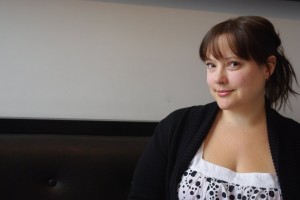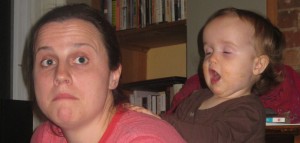November 16, 2010
The Royal Wedding: My Hunger For Good News and Happy Endings
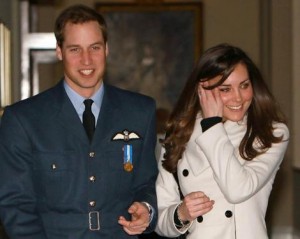 I don’t believe in fairy tales, except for the “happily ever after”, and I think that’s meant to be the part that’s suspect. Even so, it’s totally baffling why I started crying this morning upon hearing on the radio that Prince William and Kate Middleton had become engaged. I don’t really care about celebrity weddings, I think any country in this century would be better off without a royal family (unless, of course, I was the queen), princess fetishization makes me sick, and back when Prince William was everybody’s favourite pin-up, he was never ever mine– so why am I so overjoyed? Why am I fully prepared to set a clock for whatever o’ clock in the morning one day next summer, and all set to run out right away to buy a commemorative plate, or cup and saucer?
I don’t believe in fairy tales, except for the “happily ever after”, and I think that’s meant to be the part that’s suspect. Even so, it’s totally baffling why I started crying this morning upon hearing on the radio that Prince William and Kate Middleton had become engaged. I don’t really care about celebrity weddings, I think any country in this century would be better off without a royal family (unless, of course, I was the queen), princess fetishization makes me sick, and back when Prince William was everybody’s favourite pin-up, he was never ever mine– so why am I so overjoyed? Why am I fully prepared to set a clock for whatever o’ clock in the morning one day next summer, and all set to run out right away to buy a commemorative plate, or cup and saucer?
I was only two when Diana married Charles in 1981, though I do remember the excitement of Prince Andrew’s wedding to Sarah Ferguson a few years later. What I remember most about the first royal wedding, however, is that my Nana had their commemorative plates displayed in a rack in her dining room, and that we totally loved Diana. To be so unjaded– I long for that. I learned the expression “on the rocks” from the headline of a supermarket tabloid a few years later, and I remember my mom reassuring me that Chuck and Di were not so– the newspaper was a rag, she said. It hadn’t occured to me that Prince Charles might want to be somebody’s tampon, never not even once.
This evening in a nostalgic mood, I referred to the authoritative text on the 1981 Royal Wedding, which was The Secret Diary of Adrian Mole aged 13 3/4. How he felt it was his “patriotic duty” to hang bunting in the street, and his disappointment in his father whose celebration consisted in hanging a Charles and Diana tea towel on the door. “ROYAL WEDDING DAY!!!!!/ How proud I am to be English!/ Foreigners must be sick as pigs.”
Anyway, I do believe in “happily ever after”, though the world keeps conspiring to prove me wrong. Not always, however– miracles happen. Remember the time my next door neighbour rose from the dead? And now Tabatha Southey has gone and been returned to the Globe and Mail, because they were clearly nothing without her. So maybe William and Kate will stay as happy as they look, and I’ll never have to explain what “on the rocks” means to Harriet, or if I do it will only be in the context of Jordan or some Kardashian.
November 16, 2010
How to get hold of a book
“…I went off to work, stopping on the way at Kensington Public Library to get a copy of John Henry Newman’s Apologia, which I had long promised Maisie Young. She could quite well have procured it for herself during all those weeks, disabled as she was, but she belonged to that catagory of society, by no means always the least educated, who are always asking how they can get hold of a book; they know very well that one buys shoes from a shoeshop and groceries from the grocer’s but to find and enter a bookshop is not somehow within the range of their imagination.” — from Muriel Spark’s Loitering With Intent
November 15, 2010
Author Interviews @ Pickle Me This: Zoe Whittall on The Middle Ground
Zoe Whittall is author of novels Holding Still For As Long As Possible and Bottle Rocket Hearts, which was named a Globe & Mail Best Book of 2007. She won the Writers’ Trust of Canada’s Dayne Ogilvie Award in 2008, was shortlisted for the 2010 ReLit Award, and is currently adapting both novels for screen. Her poetry books include The Best Ten Minutes of Your Life, The Emily Valentine Poems and Precordial Thump. She edited the anthology Geeks, Misfits & Outlaws in 2003. She lives in Toronto, where she works as a journalist.
When the clocks went back two weekends ago, I used my extra hour to devour Zoe Whittall’s latest novel. The Middle Ground is short, fast-paced and plot-driven, part of the Rapid Reads Series by Orca Book Publishers. I was particularly interested in the book as a tool for adults with low literacy, permitting them access to the bookish magic that so many of us are lucky to take for granted.
Zoe was kind enough to answer some of my questions about Rapid Reads, and writing a book like The Middle Ground.
I: Can you tell me about Rapid Reads? How did you come to be involved in writing for the series?
ZW: I learned about the Rapid Reads publishing program at Orca through my agent, Samantha Haywood at TLA. She knew they were looking for authors, and I had just finished writing HSFALAP and was taking a creative breather between big projects. I also knew I was about to start working on the script for the Bottle Rocket Hearts film. I was drawn to the idea of writing a short book that was straightforward and high on plot and suspense. I’ve never been that great at plot, so I figured this would be a really good exercise for me as a writer, and something that would help me when I started writing the script, because you always have to be mindful of action and conflict in every single scene. I read a whole bunch of mystery novels as research into how to craft suspense, and built on that. I’d spent years reading a lot of poetic prose, experimental narratives and literary novels, so switching gears this way was very helpful, I think, in the long run.
I: What direction were you given by the publisher?
ZW: I was given very specific direction by my publisher, and wrote several drafts of plot outlines before they approved it and we signed the contracts. Basically, the book had so be short, with simple vocabulary, employ no flashbacks, have no more than a handful of characters, and it had to move forward as fast as possible. It sounds easier than it was.
I: What challenges were surprising?
ZW: I only had a limited amount of pages in which to explore who Missy is and why she would decide to make so many unlikely or irrational choices. I read a fair amount about Stockholm syndrome and how different personalities might react to crisis or violence. I thought a lot about how she might feel about the three major aspects of her life – her job and financial stability, her love life, and her child and family – and if all three of those constants in her life were disrupted in one day, the same day that she is a victim of a crime, how would she deal?
I wrote the book while visiting the small town where my partner grew up, so I felt like the setting was easy to settle into it. I also spent my childhood on a farm, and identify with rural life, so that was comfortable. But Missy is about as different from me as you can imagine, so that was a challenge, but a great one. It’s like playing dress-up in a way.
It was challenging to orchestrate the crime scene as the end – I spoke with some police and former police to know how the cops would enter the space, and if Missy would be considered a victim or accomplice, all of those technical details. I drew a lot of diagrams, about things like “if his back is turned, and she’s by the garbage bins, and the people run towards the door, who would be able to see who, and how would they move fast in this short period of time? What could she say that would provoke him to shoot, where could she be shot so that she wouldn’t be die..” those kinds of details, etc.
I: Did you have to know Missy as deeply as you’d come to understand a character from your other novels? Was there a different way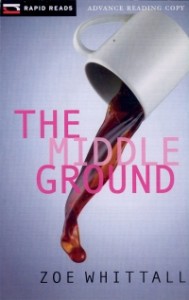 of going about coming to understand what she was?
of going about coming to understand what she was?
ZW: Because I wrote this book in about three months, the bulk of it in a few weeks, I wasn’t as immersed in the story as I was with Bottle Rocket Hearts (ten years) and Holding Still (three years). I went about understanding her more methodically, strategically almost. All of my other characters generally appeared to me in those magical unconscious moments and, and then once I figured out some of their basic personality traits and personal histories, I slowly started making them do things. I knew Missy had to go through the story I’d decided ahead of time, so I got to know her in terms of what I know had to happen.
I: What is considered “simple” vocabulary? The vocabulary level didn’t seem terribly conspicuous as I read your book– did you have to work against your own writerly instincts to make it work, or did it come fairly naturally?
ZW: Sentences had to be shorter, and vocabulary had to be at a certain grade level. I can’t remember which one. When I handed in my first draft, the editor said they had to take it down a few notches with regards to some word choices, but that’s about it.
I: As a writer, what lessons did you learn about plot?
ZW: I had to insert some sort of conflict into each chapter, she always had to be making a decision or reacting somehow, so that it would move along. I suppose I learned not to be afraid of action, because it can be difficult to write in a way that is not cliche and television-like.
I: I can’t imagine how difficult it must be to be an adult with low literacy, and having most learning resources at your level geared towards children or idiots. So what a wonderful novel The Middle Ground is, in addition to a riveting read for anyone. Have you had the opportunity to receive any reader feedback on your novel?
ZW: Yes, it must be very difficult. I have not had any opportunity to hear feedback yet. Because it was just nominated for a Golden Oak, I will be making some author appearances in libraries and I hope to meet some readers at that point. It’s an entirely new market to me, so I’m looking forward to connecting with potential new readers.
November 15, 2010
My review of People Live Still in Cashtown Corners in today's G&M
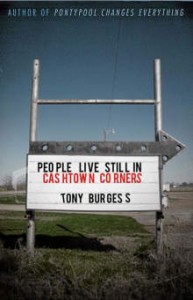 My review of Tony Burgess’ People Live Still in Cashtown Corners appears in today’s Globe and Mail. A disturbing story from the perspective of psychotic murderer, with a small dose of zombie close to the end. And, unbelievably, I liked it! Read my review here.
My review of Tony Burgess’ People Live Still in Cashtown Corners appears in today’s Globe and Mail. A disturbing story from the perspective of psychotic murderer, with a small dose of zombie close to the end. And, unbelievably, I liked it! Read my review here.
November 14, 2010
Talking About Detective Fiction by PD James
 I am a detective fiction neophyte– I only read my second Dorothy L. Sayers last week. The book was Strong Poison, featuring Harriet Vane who’d been introduced to me in the marvelous Gaudy Night. And I thought it was fitting that I follow up Stong Poison with P.D. James’ nonfiction book, Talking About Detective Fiction.
I am a detective fiction neophyte– I only read my second Dorothy L. Sayers last week. The book was Strong Poison, featuring Harriet Vane who’d been introduced to me in the marvelous Gaudy Night. And I thought it was fitting that I follow up Stong Poison with P.D. James’ nonfiction book, Talking About Detective Fiction.
It’s possible that I am exactly P.D. James’ intended audience here. Long prejudiced against genre fiction of any kind, though with a penchant from very young for smutty true crime books, but there you go. I found my way into detective fiction via Kate Atkinson, and her Jackson Brodie. I became addicted to television’s Midsomer Murders (which is based on the books by Caroline Graham). I also like Susan Hill, and recently enjoyed The Dead Politician’s Society by Robin Spano. I particularly adored Sayers’ Gaudy Night which, as James asserts, demonstrates that “it is possible to construct a credible and enthralling mystery and marry it successfully to a theme of psychological subtlety.”
But there is a lot I have to learn, such as that “crime fiction” is an umbrella under which detective fiction falls. The sacred rules of detective fiction, which all the best writers find ways to creatively skirt, including that the criminal must not be a character whose thoughts the reader follows, the detective should never know more than the reader does, no more than one secret room or passage, no intrusion by supernatural elements, no twin brothers or doubles unless the reader has been prepared. That there was no such thing as detective fiction before 1842, because there had been no detectives (or at least not in England– it was the year the Metropolitan Police came into being). The eternal allure of Sherlock Holmes (and one of the funniest parts of the texts is when James questions, at length, the reasons why H0lmes and Watson had continued to share a small flat from which Watson would have to retire to the bedroom when guests came around). James deals primarily with English detective fiction in the book, but devotes a chapter to the very different direction taken by the genre in America, with “hard-boiled” detective stories about Sam Spade and Philip Marlowe. I also particularly liked her chapter “Four Formidable Women”, which included Agatha Christie and Sayers.
I expect the true detective fiction devotee might not find a lot here that’s new, and moreover could even find plenty to quibble with, but all the same, James’ book is clever, funny and engaging, and manages to convey some of the suspense and characterization of her novels. For a reader like me, however, Talking About Detective Fiction is a delight, a fine celebration of a genre I’m looking to know better.
November 11, 2010
Black, White, and Read All Over
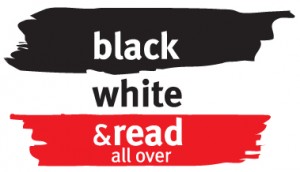 I had the privilege of attending Black White and Read All Over event last night in support of Literature for Life. Keynote speaker was Terry O’Reilly, who talked to us about the power of storytelling. Underlining his message were presentations by three women who have participated in Literature for Life’s reading circles, and read us their poetry and spoke about their experiences as young mothers who were positively liberated by the power of reading and given direction in their lives. The whole evening was so inspiring, and it was thrilling to see such support for this wonderful organization.
I had the privilege of attending Black White and Read All Over event last night in support of Literature for Life. Keynote speaker was Terry O’Reilly, who talked to us about the power of storytelling. Underlining his message were presentations by three women who have participated in Literature for Life’s reading circles, and read us their poetry and spoke about their experiences as young mothers who were positively liberated by the power of reading and given direction in their lives. The whole evening was so inspiring, and it was thrilling to see such support for this wonderful organization.
Over the next few months, I’m going to be administering the Literature for Life blog, which has an interim home here while we set up the new website. Check out this post in particular to for a remarkable testimonial from a former participant. I’m also going to be working with CreateMeThis in the next few weeks to get the new website redesigned and up and going, and we’re very excited about what lies ahead.
November 11, 2010
"Love is a Let-Down"
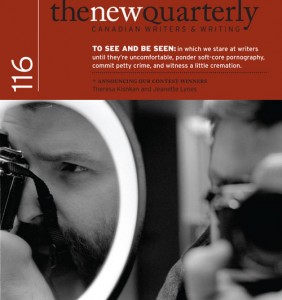 I spent the first six weeks of my daughter’s life amazed at her fabulousness, but also spectacularly miserable. It was really truly the worst time of my whole life, which was far from what I’d expected from my intro to motherhood, and I really thought that there I’d just gone and destroyed my entire life. I remember being terrified that my husband would leave me, which had never crossed my mind before, but in the awful stupor of that time, I couldn’t think of single reason why he’d stay. I remember crying with the windows open, with the hope that somebody might pass by and come in to take the baby away.
I spent the first six weeks of my daughter’s life amazed at her fabulousness, but also spectacularly miserable. It was really truly the worst time of my whole life, which was far from what I’d expected from my intro to motherhood, and I really thought that there I’d just gone and destroyed my entire life. I remember being terrified that my husband would leave me, which had never crossed my mind before, but in the awful stupor of that time, I couldn’t think of single reason why he’d stay. I remember crying with the windows open, with the hope that somebody might pass by and come in to take the baby away.
I maintain that I didn’t have post-partum depression, but just a bad case of the baby blues, but moreover that life with a newborn is generally awful. And though at the time I feared my bad introduction to motherhood might set the tone for everything that comes after, it didn’t. They were so right, those friends who told me that the first three months are all about survival, and they were so wrong, those other people who told me to make sure I “enjoyed every minute”. Ha.
Anyway, life got much much better, but I began to notice a pattern. Whenever anyone I know had a newborn, I’d speak to her around the one-week mark, and she’d tell me that things were going okay. She’d note that she was more than a little sleep deprived, and I’d recognize a slight waver in her voice. And then I’d confess that at the one-week mark, I was more unhappy than I’d ever been before or since, and the person I was speaking to would breathe a sigh of relief then, that she wasn’t the only one. That these feelings she was experiencing were more common than she’d thought. I’d assure her that things would get better, and she wouldn’t believe me at all, but as the weeks went by, she’d come to see that it was true, and soon she’d be out on the other side herself, and we’d even laugh about it.
I wrote my essay “Love is a Let-Down” this spring after a friend of mine had been suffering through the awful, and our conversations had brought up everything about new motherhood that I’d actually nearly forgotten. I entered it into The New Quarterly‘s Edna Staebler Personal Essay Contest, and was so happy to discover in August that it had placed as a runner-up. And I’m happy now to announce that my essay appears in TNQ 116, which is out now or soon, and will be available at your favourite bookstore. I urge you to pick up a copy, because it’s a piece that I am really proud of, that is terribly important to me, and I think has the potential to help somebody who’s where I was then.
Also because the fantastic issue contains work by some great writers, a disproportionate number of which have been interviewed on Pickle Me This: — Jessica Westhead, Rebecca Rosenblum and Kerry Ryan. I’m also looking forward to Sarah Selecky (of Giller fame!) and A.J. Somerset (of the Metcalf-Rooke award).
Update: A lovely post up about my essay at the Utne Reader Blog “Great Writing”. Which is definitely some nice feedback. And a nice blog.
November 10, 2010
The kind of mother I wanted to be
 I’ve read two really excellent pieces on mothering blogs lately, the first being “I was a better mom before I had kids…” and then Her Bad Mother’s “On Being a Good Mother In Spite of It All.” Both play with the expectations we set for ourselves before we become parents, and what the reality turns out to be, and I think these kinds of discussions are useful actually, to a point. HBM rounds out her piece with the idea that trying to be a certain kind of mother when your heart’s not in it isn’t going to be good for anyone– for example, baby-wearing because you think you should, but your back is killing you and you hate it, or quitting work to stay home with the baby when it makes you miserable. She was writing in response to a recent article by Erica Jong about the ridiculousness of attachment parenting (“On the Madness of Modern Motherhood”).
I’ve read two really excellent pieces on mothering blogs lately, the first being “I was a better mom before I had kids…” and then Her Bad Mother’s “On Being a Good Mother In Spite of It All.” Both play with the expectations we set for ourselves before we become parents, and what the reality turns out to be, and I think these kinds of discussions are useful actually, to a point. HBM rounds out her piece with the idea that trying to be a certain kind of mother when your heart’s not in it isn’t going to be good for anyone– for example, baby-wearing because you think you should, but your back is killing you and you hate it, or quitting work to stay home with the baby when it makes you miserable. She was writing in response to a recent article by Erica Jong about the ridiculousness of attachment parenting (“On the Madness of Modern Motherhood”).
Now I am fortunate, because I came into parenting completely unaware that “attachment parenting” was even a thing. Or rather, I knew about it, but simply as one of the faddy things I learned about from reading Christina Hardyment’s Dream Babies (along with Baby Whispering, and airing your child in a cage suspended from an apartment window). So my idea of the kind of mother I wanted to be didn’t come with a doctrine. My parenting philosophy, if I have one (but I don’t) has kind of grown up with me– for example, I learned that strollers are awkward in narrow Bloor Street shops and many places have steps, so I became a Baby Trekker convert (and we’re at 28 lbs and still going). I learned that some nights the only way anyone in our house would get some sleep was if Harriet came to bed with me and so (I guess?) we became part-time co-sleepers. It has always been important to me to take responsibility for having brought a child into the world, thereby doing some extra laundry instead of contributing to landfill, so I am a bit of a cloth diaper fanatic. I still breastfeed, but was never able to pump, so Harriet had formula when I wasn’t around. I don’t buy plastic toys We don’t own a car or a television, and I don’t want to own either, and it has been important to me to learn how to be a parent without both of these things.
-
And so what I dislike about the discussions I noted is the way they descend into this bad-mother free-for-all. As if the very idea of using cloth diapers is laughable, or keeping small children away from television or limiting consumption . And I realize that a lot of this is very easy to say from the perspective of a mother of one, though I will point out that my belief in these ideas is part of the reason I am a mother of one (for now)– having one child is one of the reasons we’re able to make things work for us the way we want to. But I just feel that sometimes we’re all so busy congratulating ourselves for our honesty (like that a six month old got turned on to McDonalds. Really???) that we forget that some of these ideals are really sound ideas, and maybe the reason we feel guilty sometimes is that we should… Not because we let our children go out with dirty faces (see photo), or go out looking dumpy (also, see photo) of course, or lose our tempers etc. These are little things, they’re silly things. But there are bigger issues at hand, and somehow they get swept into the same catagory of impossible things. Like motherhood is just a slippery slope, and we’re all now looking up from the bottom.
I really am writing this now not to be a smug pain in the ass, but as reassurance for women who aren’t moms yet but who have an idea about the kind of mothers they want to be. If that idea comes from an authentic place within you, if you’re doing it because you want to and you believe in it (as opposed to the unsustainable arrangement derided by HBM of what you think you should be doing), then it’s totally possible. Of course, half the equation is your baby, and all bets are off as to what he or she will decide, but I want to assert that motherhood as an institution does not necessary push you to the bottom of that slippery slope. You’re exactly as indomitable as you feel.
November 10, 2010
The Carnivore by Mark Sinnett
 I first learned of The Carnivore when it was on the shortlist for the Toronto Book Award, and its author Mark Sinnett was reading an excerpt on the radio. The excerpt was intriguing, featuring a husband and wife meeting together on the shore of Lake Ontario as swimmer Marilyn Bell completed her crossing of the lake in 1954. The simple dynamic between the couple belied something darker and deeper, and the historical detail was inconspicuously well done. When The Carnivore ended up taking the prize, I knew that I had to read it.
I first learned of The Carnivore when it was on the shortlist for the Toronto Book Award, and its author Mark Sinnett was reading an excerpt on the radio. The excerpt was intriguing, featuring a husband and wife meeting together on the shore of Lake Ontario as swimmer Marilyn Bell completed her crossing of the lake in 1954. The simple dynamic between the couple belied something darker and deeper, and the historical detail was inconspicuously well done. When The Carnivore ended up taking the prize, I knew that I had to read it.
When Ray Townes is in the final stages of emphysema, he and his wife Mary look back on the course of their marriage, and how their lives hinged on Hurricane Hazel, which ravaged Toronto in October 1954. The couple doesn’t look back together, however, the book consisting of alternating chapters from their two solitudes. The effect of this is interesting, as we learn that each of them has their own secrets about how much they know about the other and what they’ve chosen to withhold.
Ray is a police man who spent the hurricane rescuing citizens clinging to rooftops and washed out bridges. What the newspaper articles profiling his heroics fail to reveal, however, is that his courage that night stemmed from a mania that arose from a terrible act he’d committed, and that while he was supposed to be on duty, Ray had been driving around the city with his mistress. Mary is aware of all of this, however, which is why she resents the rehashing of events as the 50th anniversary of the hurricane approaches. She has never been able to forgive her husband for what he did and what he took from her, and now her own traumatic memories of the hurricane have been awakened– she was a nurse at St. Joseph’s Hospital, and witnessed horrific injuries that night she’d never been able to forget.
Sinnett’s depiction of the hurricane– the rushing rivers, the broken bodies in the hospital, the force of nature that tore its way through a city– are the most compelling aspect of the novel. They are riveting, illuminating and unflinching in their portrayal of a tragedy that seems to have been whitewashed by years of familiarity– like Hazel was somebody’s elderly aunt who came visiting once. Sinnett deftly uses detail in the story to describe the hurricane and the more general atmosphere of Toronto in 1954, his historical fiction not toned by sepia even though the book is structured as a reflection.
The back-and-forth in the narrative, and that the story is told to the reader rather than immediately experienced makes the plot read a little mechanically at times. Similarly the characters, who we’re permitting such a limited perspective of by their own voices and the partner’s perspective. Though some of the gaps Sinnett leaves in the character are interesting– we don’t get all the answers about why they’ve done the things they have, and that space to ponder is particularly engaging.
The Carnivore is a worthy recipient of The Toronto Book Award, a deserving book that will strike a chord with readers from Toronto and elsewhere. A book that uncovers another layer to a city we think we know.
November 10, 2010
Rare Giller Treat
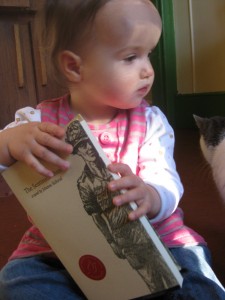 Look what Harriet found this morning! I look forward to reading it. If judges think it’s even better than Light Lifting, we’re really in for something brilliant.
Look what Harriet found this morning! I look forward to reading it. If judges think it’s even better than Light Lifting, we’re really in for something brilliant.
